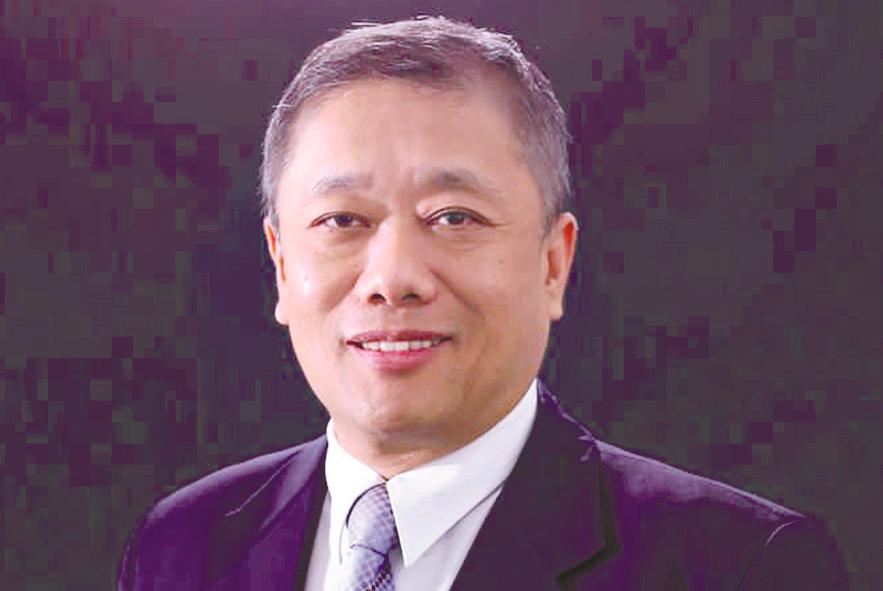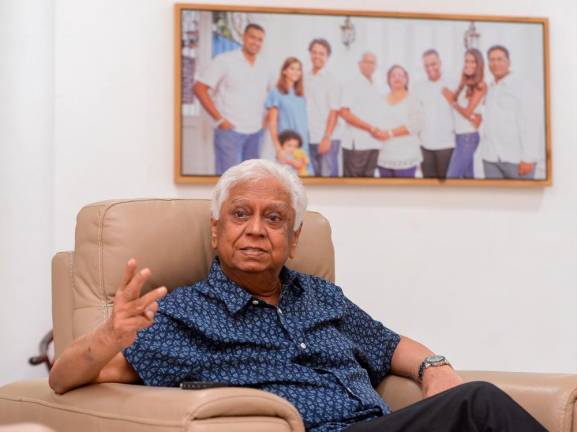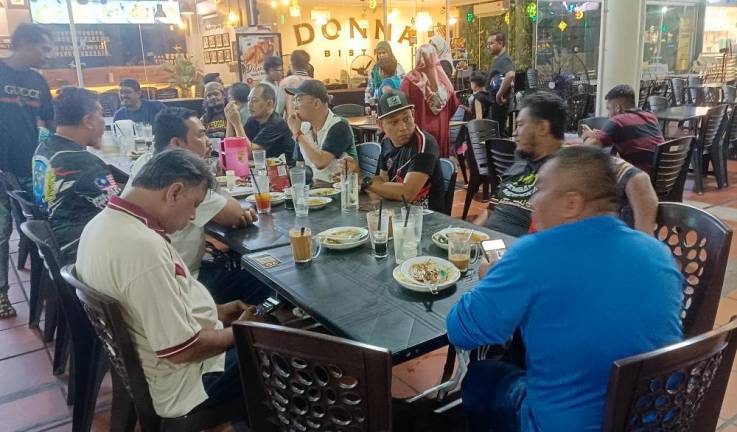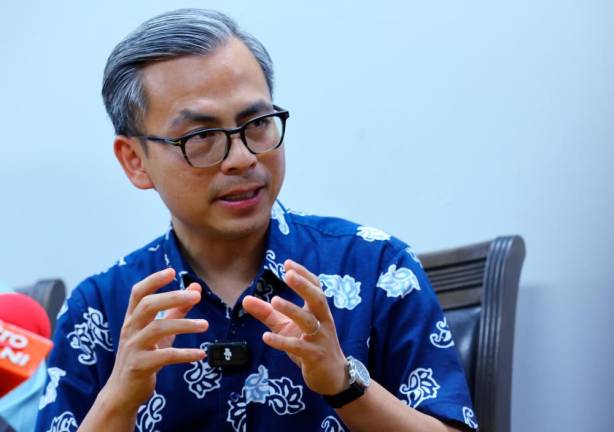IN this week’s Success: The Insight Story column, SME Association of Malaysia national president Ding Hong Sing (pic), who is also PA Food Sdn Bhd founder and managing director answers SunBiz’s questions.
How has your life experience made you the leader you are today?
I was 20 years old when I joined Hazama Bumi Sdn Bhd, a Japanese construction company, back in 1982. I had no formal education qualification so it was difficult for me to find my way around the engineering business and gain the respect of colleagues.
Over the course of three years, I became a site supervisor by learning through my own initiative and working hard. I also helped the company save several million ringgit in a work project, eventually gaining the approval and trust of my Japanese boss. He passed me a sum of money as a token of appreciation and kind regards when I left the company in May 1985 to start my own business – the beginning of PA Food.
The PA Food business started in my kitchen with three family members as helpers. Today, we employ over 200 employees.
Based on my experience, I believe people can become good at what they do if they are first given a chance to try their best, then guided and corrected by a senior based on the results produced.
I was president of the SME Association of Hulu Langat in Selangor for 16 years and National Treasurer of SME Malaysia for 13 years, besides holding various council positions in trade, clan and school associations since 1998. These have sharpened my leadership skills in not-for-profit and voluntary organisations.
What traits do you look for in your talent or how do you decide who is right for a job?
In order of importance, I look for a responsible character first, related work experience and a willingness to learn new things.
How do you think the industry you are in will evolve?
Generally speaking, the manufacturing industry will require:
1) far higher levels of automation to reduce reliance on human labour and enhance productivity;
2) more numbers of new and innovative products; and
3) greater export activity for Malaysian-grown products to penetrate new markets abroad.
What advice can you offer those looking to start their career/own business?
Focus on branding to enhance your company’s image, products and services. Young entrepreneurs must embrace new technology and learn about current trends in digitalisation and automation according to the industry they operate in.
We all know about the industrial revolution, are we in for a technological revolution? Your thoughts.
Yes, we are. Many markets and products now need to focus on technology and digitalisation to stay ahead. Business is evolving and we should adopt new methods of production that can increase output while using less labour and save time. However, mindset change and the willingness to adopt these new technologies are personal obstacles that SMEs need to overcome. Those who don’t adapt will be left behind in the technological revolution.
How has mentorship made a difference in your professional life?
Personally, I never had any mentor as my Japanese ex-boss adopted the “try your best first then I’ll correct you” approach. In my food business, I teach and guide the employees based on this model too. I believe that knowledgeable and skilled employees at PA Food will contribute to the expansion and prosperity of the company so I am happy to share my business knowledge for win-win outcomes.
What do you want to accomplish in the next five years?
In my role as national president of SME Malaysia, I want to get SMEs fully focused on improving the quality of their goods and services, the importance of branding and to increase their level of exports. These interrelated themes are not new yet they still fall short or have not been developed to their full potential among SMEs, based on my observations.
Best piece of advice you ever received on your career.
I never received a formal education, having studied up to Form Four in secondary school. It was HELP University’s co-founder and president, Professor Datuk Dr. Paul Chan, whom I met in the first quarter of 2022 who suggested I pursue the Doctor of Business Administration (DBA) course as I already possess 40 years of business and leadership experience.
The opportunity to further my education is now in my hands. It is exciting to be a university student at my age and to attend a combination of online and physical classes at the HELP University campus. It will be a proud day for me to earn a Doctorate title through my own efforts when I graduate.
Most-admired business leader? Why?
I admire Malaysian tycoon Robert Kuok, leader of the Kuok group with interests in properties, logistics, hospitality, food, agribusiness and maritime. He has the business acumen to select and successfully run enterprises whose products and services every one requires.
As I am in the food industry too, I marvel at his investments in commodities such as flour, sugar, palm oil and bread which will always be in demand by consumers. These industries will still perform well during economic slowdowns as they are food staples.
How do you stay abreast of issues affecting your industry?
My daily schedule as SME Malaysia national president is packed with meetings since the association is represented on numerous consultative panels of government ministries and agencies to escalate issues affecting SMEs for discussion and resolution.
SME Malaysia is a supporting partner with state and private entities in respect of industry-related collaborations and events – such as halal certification, Industrial Revolution 4.0 themes of digital transformation, technology and automation, human resources, education, business expos – which I attend in my official capacity. These events serve to update me on latest industry developments and trends.
I also read digital newspapers, the internet and news from WhatsApp business groups.
How do you expect policies on climate change to impact businesses?
Many SMEs in Malaysia are not ready to implement climate change policies immediately. For example, requirements on green technology and reducing their business’ carbon footprint. In respect of environmental, social and goverance (ESG) issues, most SMEs are just coming to terms with the concepts although I recognise that some companies have begun to take baby steps vis-à-vis environmental and social indicators as they realise the benefits of ESG for their businesses.
Policies on climate change that do not consider the state of preparedness of SMEs will affect these businesses badly, especially if fines or penalties are imposed for non-compliance. As such, Government policies should be customised to suit the local business setting with prior consultation with stakeholders, besides the offering of financial or tax incentives for buy-in from the SME community. Another option is early announcement of policy implementation timelines to enable SMEs to prepare their businesses ahead for eventual compliance in several years’ time.
If you could have an hour with any thought leader in the world, whom would it be and why?
That would be Jack Ma. I would like to learn from his experience in strengthening Alibaba’s capabilities and business standards through the use of IT and digitalisation. It would be ideal to apply his technology pointers to transform and grow my food business, where applicable.
What has been the biggest challenge you have faced and what did you learn from it?
The biggest challenge so far was a lack of cash flow to operate my business during the two-year Covid-19 pandemic. At times, there were no incoming collections to cover high operating expenses for my companies.
I learned how to survive without money as an SME. This included cutting expenses where possible.
What was the most outlandish business proposal you have ever heard of?
I received not one but two separate enquiries to open factories in third world countries. Power supply is known to be lacking and unstable in those countries. The frozen food business in which PA Food operates requires high electricity consumption, hence those business proposals were not suitable for consideration.
What man-made innovation confounds you? Why?
PA Food acquired a fully automated production line recently. As with new automation, I found the system “too high-tech” at first and could not understand its workings. The puzzle was unravelled once the machine supplier explained the mechanics of the production line and how to operate it. New technology may appear unfamiliar to us but we will be able to learn the ropes once we understand it. We are never too old to learn new things if they benefit us.
Malaysia’s greatest brand.P
Petronas. It is internationally known and acclaimed.
A must-read for every business owner/manager is ...
Quality and management. No specific books or magazines to recommend, but the two subjects are a “must-know” for daily practice by business owners, general principles of which can be modified to suit each setting.
Quality is important for products and services as consumers are very discerning in their purchase decisions. Human and productive resources should strive to be of quality too. And management is all about managing people and time. These are key focus areas for any entrepreneur.
What are the top three factors you would attribute your success to?
One, aAdherence to global food safety standards, i.e. ISO 22000, HACCP, BRC, Halal and RSPO. Two, branding of PA Food and its products.
Three, Products with added-value. Added-value products command a higher profit margin.









